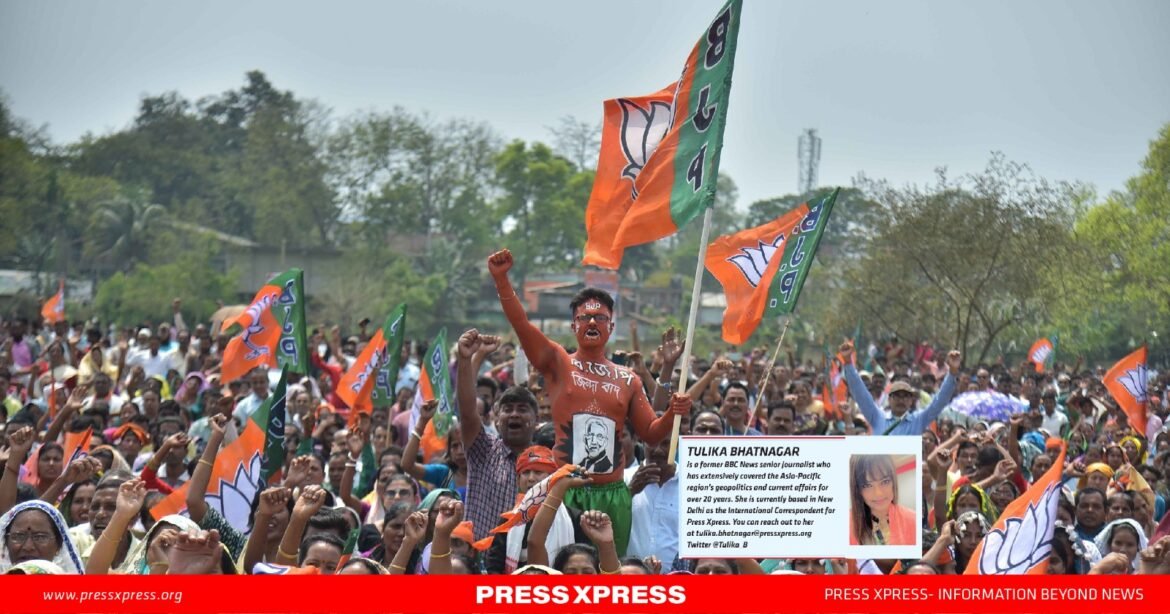India is holding two key state elections in November – the eastern state of Jharkhand and the western Maharashtra state.
It’s a high stakes battle for both the ruling Bharatiya Janta Party (BJP) and the Opposition, as these polls will set the tone for next year’s political contests in Delhi and Bihar. The polls are also pivotal because regional parties in these states are significant to national politics and alliances.
Jharkhand: Battle for tribal land

The eastern state of Jharkhand is a relatively new state, carved out in November, 2000.
It has 81 legislative assembly seats and 2.6 crore eligible voters, who will choose their representatives for 43 seats on 13 November, and for 38 seats on 20 November. The votes will be counted on 23 November.
But what’s made the assembly polls here interesting is the direct contest between Modi’s BJP and the opposition Congress, which is a part of the state’s ruling alliance led by Jharkhand Mukti Morcha (JMM), a regional party.

The tribal heartland of India faces serious challenges such as poverty, unemployment, and lack of development. But the state is also one of the world’s richest mineral zones, with 27% of India’s coal reserves, 26% of its iron ore reserves, and 18% of copper ore reserves. It also accounts for 25% of India’s total steel production.
In the current election, BJP’s key campaign issues have been around corruption allegations against the State Chief Minister Hemant Soren as well as demographic shifts owing to alleged infiltration from Bangladesh.
Previously, Jharkhand has been a stronghold of the BJP, which ruled it for 13 years. But the party has been struggling to recapture the tribal vote in recent years.
This year, BJP leaders have repeatedly stated that the tribal population is dwindling due to illegal Rohingya and Bangladeshi immigrants’ infiltration. The saffron party has also accused the JMM and Congress of harbouring illegal immigrants for votes.
The JMM, in turn, has accused the BJP-led Centre of withholding funds due to Jharkhand. The JMM has also launched populist schemes to woo tribal voters, such as promising cash benefits of 1,000 INR or more per month. The BJP has also promised similar schemes if it comes to power in the state.
A Matrize opinion poll conducted recently predicts that BJP will win between 42-48 seats with a vote share of 44.3%, while the JMM will secure 12-17 seats, with vote share of 17.4%. The Congress party is predicted to gain a vote share of 10.5% with 4-9 seats win. Overall, the poll predicts a landslide victory for the BJP-led National Democratic Alliance (NDA).

Maharashtra: Battle for Bollywood and political clout

As one of India’s largest and wealthiest states, Maharashtra contributes more than 13% to the country’s GDP and is home to key industries like finance, Bollywood, and technology.
It is also a political powerhouse because of its historic and prominent role in shaping national politics. It holds 48 seats in the Lok Sabha, lower house of Indian parliament, making it the second-largest after Uttar Pradesh (80 seats).
The upcoming assembly election in the state on 20 November will see key battles between the ruling Mahayuti alliance and the Opposition Maha Aghadi Vikas (MVA).
Mahayuti is the alliance between BJP and regional parties – Eknath Shinde’s Shiv Sena and Ajit Pawar’s Nationalist Congress Party (NCP).

MVA is the alliance led by the Congress with regional parties – Uddhav Thackeray’s Shiv Sena-UBT and Sharad Pawar’s NCP-SP.
Political pundits are keen to watch the voting trends in wake of the Lok Sabha setback that the BJP faced earlier this year, with its alliance winning only 17 of 48 parliamentary seats while the opposition MVA won 30.
Of the total 288 assembly seats in Maharashtra, the high-stakes battle is being fought by the BJP on 148 seats, with its regional partners contesting 80 (Sena) and 53 (NCP) seats. On the MVA side, Congress is fighting on 101 seats, with Sena (UBT) on 94 seats and NCP (SP) on 88 seats.
It’s mostly a war of factions with family-centric electoral battleground taking centre-stage – brothers, cousins, uncles, and even husband and wife are contesting from rival parties.
One of the most high-profile family battles is Yugendra Pawar challenging his uncle, Deputy Chief Minister Ajit Pawar from the important seat of Baramati.
In another unusual face-off, independent candidate Harshwardhan Jadhav will contest his estranged wife Sanjana Jadhav.
Women, farmers, and jobs remain the main voter issues, while the Bollywood and financial capital of Mumbai will see 420 candidates contest for 36 seats.
According to the Matrize survey, the BJP is expected to receive significant support in western Maharashtra (48%), Vidarbha (48%), and Thane-Konkan (52%) while the Congress-led MVA is projected to perform strongly in regions such as North Maharashtra and Marathwada, with anticipated vote shares of 47% and 44%, respectively. Overall, the survey, like Jharkhand, predicts that the BJP-led Mahayuti alliance will win in Maharashtra.
Whether this holds true or not, the 23 November vote count will certainly reveal the answer.


